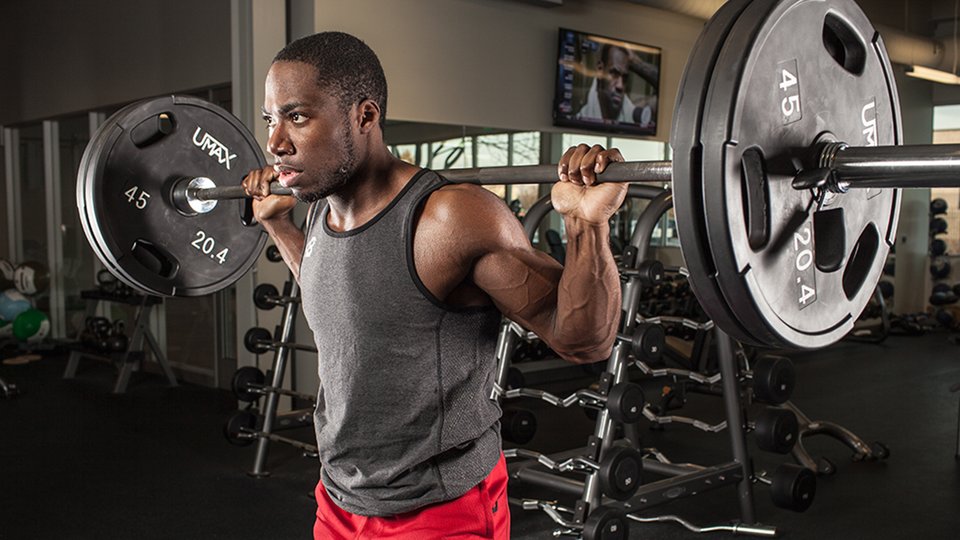Ready to get stronger, healthier, and more energized? Full body weightlifting workouts might be just what you need. Incorporating weightlifting into your fitness routine can transform your body and mind. Plus, it’s a fun and effective way to stay fit. So, let’s dive into the world of full body weightlifting and discover how you can start seeing gains in no time.

Benefits of Full Body Weightlifting
Improved Muscle Strength
Full body weightlifting workouts target multiple muscle groups, making them incredibly efficient. By working out your entire body in one session, you build balanced strength and muscle mass. This approach benefits both beginners and advanced lifters by providing a comprehensive workout that hits all the major muscle groups.
Enhanced Cardiovascular Health
You might think weightlifting is all about the muscles, but it also significantly improves cardiovascular health. Lifting weights increases your heart rate, similar to cardio exercises. This boost to your heart and lungs’ efficiency helps improve overall cardiovascular fitness, making your heart stronger and healthier.
Increased Metabolism
Ever heard of the “afterburn effect”? It’s the phenomenon where your body continues to burn calories long after your workout is done. Full body weightlifting workouts elevate your metabolism, helping you burn more calories throughout the day. This long-term benefit is a game-changer for weight management and overall health.
Better Functional Fitness
Full body weightlifting workouts improve your functional fitness, which means you’ll be better at everyday activities like lifting, bending, and carrying. These exercises mimic real-life movements, reducing the risk of injury and improving your overall quality of life.
Developing a Full Body Weightlifting Workout Plan
Assessing Your Fitness Level
Before you start any new workout routine, it’s essential to assess your fitness level. Are you a beginner, intermediate, or advanced lifter? Tailoring your workout plan to your fitness level ensures you get the most out of your sessions. If you have any pre-existing conditions, consider getting a health check-up to make sure you’re good to go.
Setting Goals
Short-Term vs. Long-Term Goals
Set both short-term and long-term goals to keep yourself motivated. Short-term goals might include completing a certain number of workouts per week, while long-term goals could involve increasing your lifting weights or achieving a specific body composition.
SMART Goals
Make your goals SMART: Specific, Measurable, Achievable, Relevant, and Time-bound. For example, instead of saying “I want to get stronger,” say “I want to increase my squat weight by 20 pounds in three months.”
Choosing the Right Equipment
Types of Weightlifting Equipment
When it comes to weightlifting, the right equipment can make a big difference. Common options include dumbbells, barbells, kettlebells, and machines. Choose equipment that suits your fitness level and the exercises you plan to do.
Selecting the Right Weights
Start with lighter weights and gradually increase as you get stronger. Proper weight selection helps prevent injuries and ensures you get the most out of your workouts.
Full Body Weightlifting Workouts
Beginner Workout Plan
Warm-Up
A proper warm-up is crucial to prevent injuries and prepare your body for the workout. Spend 5-10 minutes doing dynamic stretches and light cardio, such as jumping jacks or brisk walking.
Main Workout
- Squats: 3 sets of 12 reps
- Push-Ups: 3 sets of 10 reps
- Bent-Over Rows: 3 sets of 12 reps
- Lunges: 3 sets of 10 reps per leg
- Planks: 3 sets of 30 seconds
Cool-Down
After your workout, cool down with some static stretching to help your muscles recover. Hold each stretch for at least 30 seconds.
Intermediate Workout Plan
Warm-Up
For intermediate lifters, include advanced warm-up techniques like dynamic stretching and foam rolling to prepare your muscles.
Main Workout
- Deadlifts: 4 sets of 10 reps
- Bench Press: 4 sets of 10 reps
- Pull-Ups: 3 sets of 8 reps
- Bulgarian Split Squats: 3 sets of 10 reps per leg
- Russian Twists: 3 sets of 20 reps
Cool-Down
Incorporate stretching and mobility exercises to enhance recovery and maintain flexibility.
Advanced Workout Plan
Warm-Up
High-intensity warm-up techniques, including foam rolling and dynamic stretches, are essential for advanced lifters.
Main Workout
- Power Cleans: 4 sets of 8 reps
- Weighted Dips: 4 sets of 10 reps
- Barbell Squats: 4 sets of 12 reps
- Romanian Deadlifts: 4 sets of 10 reps
- Hanging Leg Raises: 4 sets of 15 reps
Cool-Down
Advanced stretching and recovery techniques, such as yoga or deep tissue massage, can help maintain muscle health and flexibility.
Tips for Success in Full Body Weightlifting
Proper Form and Technique
Maintaining proper form and technique is crucial to prevent injuries and get the most out of your workouts. If you’re unsure about your form, consider working with a trainer or using mirrors to monitor your movements.
Recovery and Rest
Rest days are just as important as workout days. Your muscles need time to recover and grow. Incorporate at least one rest day between intense full body weightlifting sessions. Optimize recovery by getting enough sleep, staying hydrated, and eating a balanced diet.
Tracking Progress
Tracking your workouts and progress helps keep you motivated and allows you to see how far you’ve come. Use a journal or fitness app to log your exercises, weights, and reps. Regular assessments and adjustments ensure you continue to make progress.
Nutrition and Hydration
Proper nutrition fuels your workouts and aids recovery. Before a workout, eat a balanced meal with carbs and protein. After a workout, focus on protein and carbs to help your muscles recover. Staying hydrated is also crucial for optimal performance.
Conclusion
Full body weightlifting workouts offer numerous benefits, from improved muscle strength and cardiovascular health to increased metabolism and better functional fitness. By following a structured plan and staying consistent, you can achieve your fitness goals and enjoy the journey. Remember, fitness is a marathon, not a sprint—so keep lifting, stay motivated, and enjoy the process.
We recommend that you read The Truth About Somatic Exercise for Weight Loss & Unveiling the Impacts of Social Media on Mental Health
